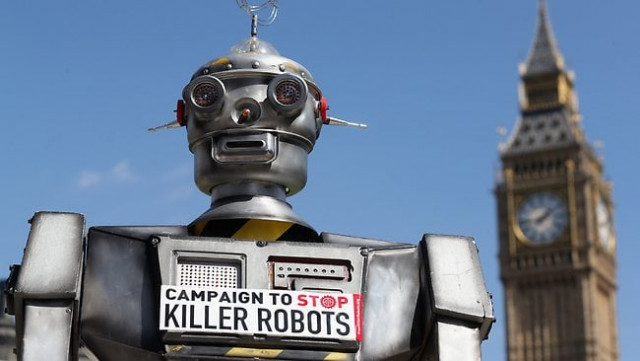Scientists urge for preemptive ban on killer robots
Future of autonomous weapons looks horrifying

PHOTO: REUTERS
In an attempt to stress the brutality of the situation, scientists at the University of California produced a short film showing tiny drones [killer robots] that can hunt and kill efficiently released by a military firm. It shows university students, activists and politicians swiftly shot in the head.
The disturbing movie highlights dangers of developing autonomous weapons that search, identify, track and kill without human supervision. Scientists are calling for an urgent preemptive ban to prevent the technology.
No sci-fi joke: 'killer robots' strike fear into tech leaders
The movie is part of a campaign led by Stuart Russell, a leading AI scientist at the University of California in Berkeley, and others. They plan on screening the film during the United Nations Convention on Conventional Weapons hosted by the Campaign to Stop Killer Robots.
“The manufacture and use of autonomous weapons, such as drones, tanks and automated machine guns, would be devastating for human security and freedom, and the window to halt their development is closing fast,” warned Russell. “The technology illustrated in the film is simply an integration of existing capabilities. It is not science fiction. In fact, it is easier to achieve than self-driving cars, which require far higher standards of performance.”
Artificial intelligence technology has found its largest contributors from the military. It allows robots to fly, navigate and patrol territories. For a long time the military has used drones for surveillance and attacks and autonomous weapons within reach.
“Pursuing the development of lethal autonomous weapons would drastically reduce international, national, local, and personal security,” Russell said.
Read: Terminators coming: Pakistan calls for ban on killer robots
A similar argument had been used by scientists convince former US presidents Lyndon Johnson and Richard Nixon to renounce the US biological weapons programme, ultimately bringing about the Biological Weapons Convention.
Since Al-powered machines are relatively cheap to manufacture, the critics say mass production of such weapons can lead to be used for the wrong reasons.
The scientists propose a treaty to ban autonomous weapons and provide framework to regulate nations working on said technology. “Professional codes of ethics should also disallow the development of machines that can decide to kill a human,” Russell said.
This story originally appeared in The Guardian.


















COMMENTS
Comments are moderated and generally will be posted if they are on-topic and not abusive.
For more information, please see our Comments FAQ